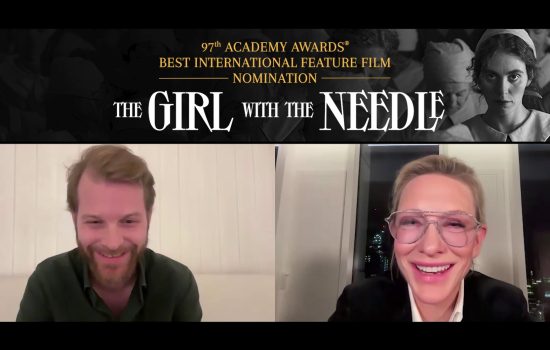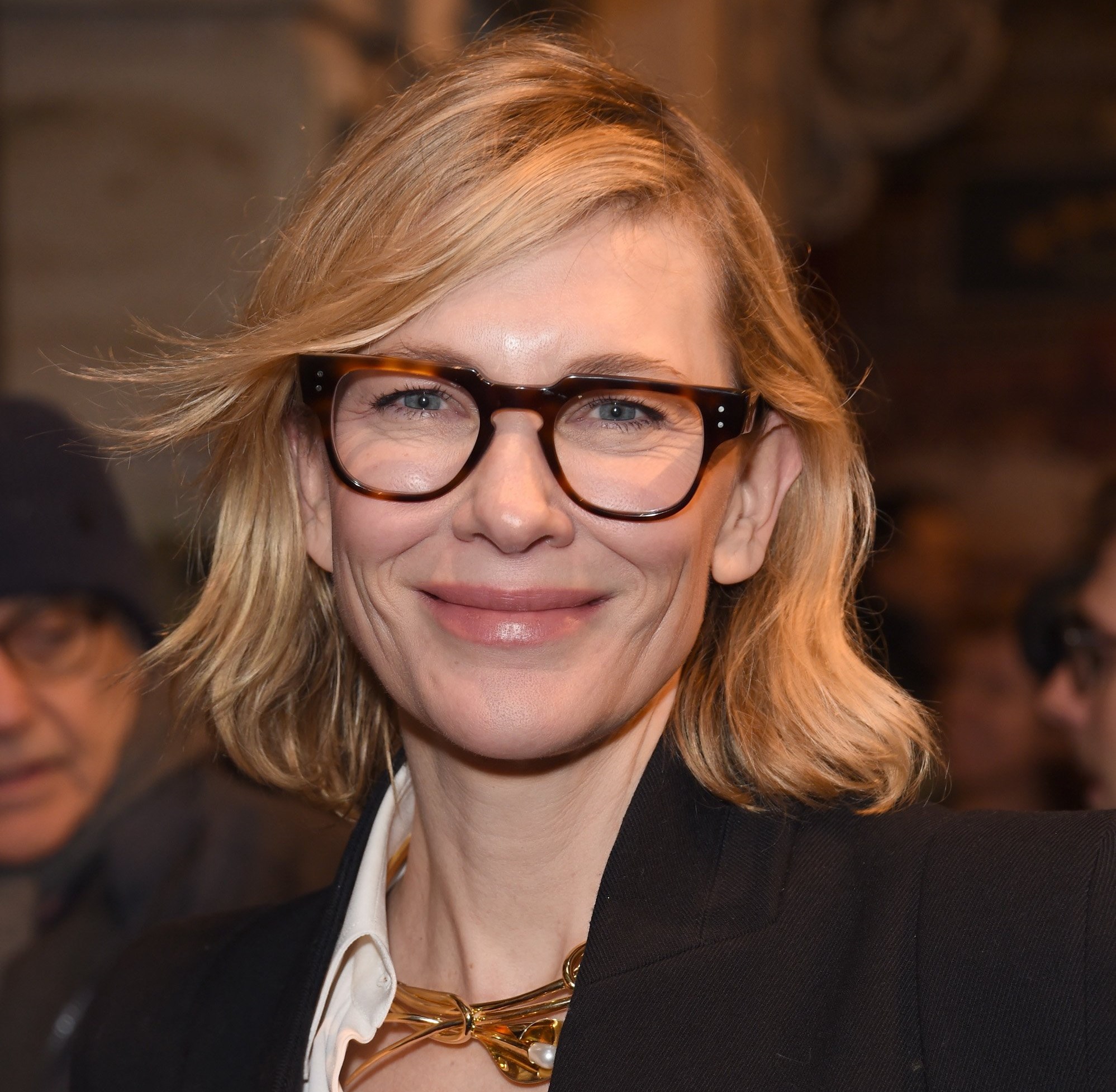New interview and two new shoots!




GQ goes drink for drink with the planet’s best actress as she makes a run at Oscar number three.
Cate Blanchett will be with me in a second, but ?rst she’s got to deal with this guy. London’s theater district. Steps from the restaurant and the restaurant bar and the ?rst of three martinis she’s about to order. The guy’s got a mustache and a polo shirt, says he’s really into the theater—he’s sort of a producer type, in fact. “What do you do?” he asks Cate Blanchett.
“I’m an actress,” she says evenly.
“Are you famous?” the guy asks.
“I don’t know!” she says to the guy who has no idea who Cate Blanchett is.
Also, come on, guy—Cate Blanchett is verily dipped in couture, in a fucking Givenchy jacket that even I can recognize, tuxedo shirt unbuttoned low, cool pink glasses with a kind of blue glow to them. Ponytail. Sleek—a cordial shark or a fashionable bullet, now making her way purposefully through the crowded bar at J Sheekey. My turn now.
Martini in hand, she turns to me with a warning about the dinner we’re about to have, which follows a long day of press. She wants to relax. She wants to have a drink or three and have a real conversation—skeptical and unfeigned and athletic, as I’m about to learn, all screwball timing and screwball edge. Mostly she wants to not talk about Cate Blanchett for a second.
“So we’re going to have to talk about something else.”
She’s been talking about herself for two days straight, part of a world tour of talking about herself—necessary promotion for Truth, a sturdy movie about the undoing of Dan Rather after 60 Minutes’ 2004 story about George W. Bush’s contested military service, in which she plays 60 Minutes producer Mary Mapes; and for Carol, the transcendent new Todd Haynes ?lm about a heedless, headlong ’50s lesbian romance. Blanchett plays the older, wiser guide to Rooney Mara’s young department-store initiate, slinging little, unbearably meaningful half-smiles and sighs like Mike Tyson jabs—it’s a wildly impressive performance, not least because it rarely feels like a performance at all.
In other words: Another year, another couple of Academy Awards conversations about Blanchett. Early October New York Post headline: “Cate Blanchett’s biggest Oscar competitor is herself.”
She’s just trying to get it all over with and go back to Sydney, where she and her husband and four kids live, and where it is very hard for studio publicity departments to get her to do things she doesn’t want to do. “The wonderful thing that I have is I live in Australia. ‘What?? The phone line’s really bad, sorry I can’t—’?” She makes a phone-static sound. “That’s when you resort to every cliché: ‘I’m really sorry, a kangaroo just got run over outside our house.’?”
A peal of serrated laughter.
Martini number two for both of us. How does Cate Blanchett drink martinis so fucking fast? She’s saying she has a basic resistance to the pat narratives foisted upon her by people in my profession, and in hers. This is less a complaint, I think, than some of her abundant natural skepticism showing through. In her Oscar acceptance speech for Blue Jasmine she reprimanded those in her industry who are “still foolishly clinging to the idea that female films with women at the center are niche experiences,” so now she’s constantly invited to symposiums on gender inequality in Hollywood. (“It just feels like the industry has the same conversation every year and I think that’s a fabulous conversation,” she says. But also, kinda, enough. “We’ll be back here like Groundhog Day next year having the same fucking symposium. It just has to shift.”) Win a couple Oscars and now Quentin Tarantino is saying,”Half of these Cate Blanchett movies—they’re all just like these arty things.” Like Blanchett has a say in how her movies are marketed: “Outside my control,” she says tersely, meaning, Don’t blame me. She’s a Quentin fan. Just the other night, in fact, she watched Kill Bill again, because she wanted her kids to see it. But then “we got to the hospital scene with Uma when she’s in a coma. And I thought, I don’t think our seven year old should be watching this. So I went and made popcorn with him in the kitchen.” (Is there any part of Kill Bill that’s appropriate for a 7-year-old? This is a question I failed to ask.)
We talk about our parents. Her father died suddenly when she was 10. Okay. “When your parents die so young, you just incorporate it,” she says. “Everyone likes to think, ‘Oh, that’s why you became an actor, that’s why you’ve got—’ They look for a narrative in your life. Suddenly, once you’ve done a few interviews, there’s an ‘Oh, I see.’ Like it’s some algebraic equation. Life’s not like that.”
In both Carol and Truth—and Blue Jasmine, and Elizabeth, and Notes on a Scandal, in so many great Blanchett roles, and there really are so many great Blanchett roles—she plays strong, powerful, smart women who are nearly torn to pieces by things out of their control. Who are steeped in grief. Performances that are clinics in showing all the ways a person can be undone. Surely it’s all somehow related?
“If you stand blank in front of a camera,” Cate Blanchett explains wearily, “there’s something you cannot control that is simply what the camera sees in you. You do nothing in front of a camera and it sees into you and there’s some quality, some inescapable quality, and it’s not really useful to know what that is.”
After her father died, she says, “I didn’t really think about my experience. I do something where I physically get up most days of the week and do weird shit and have catharsis. And so I guess any of that unprocessed stuff kind of gets worked through—it’s not that I’m seeing my job as some form of therapy. I mean, I ?nd that notion quite disgusting, actually—repulsive. But I do have catharsis in my work. If I was an unemployed actor, I think I’d probably be less emotionally healthy. You know what I mean?”
An ill-advised detour into the Sony hack, which I’d shamefacedly Googled earlier in the day, alongside the words “Cate Blanchett.” I found reports of an Aaron Sorkin e-mail to Maureen Dowd: “Year in and year out, the guy who wins the Oscar for Best Actor has a much higher bar to clear than the woman who wins Best Actress,” the e-mail said. “Cate gave a terri?c performance in Blue Jasmine but nothing close to the degree of difficulty for any of the ?ve Best Actor nominees.”
She and I had been talking about Steve Jobs—”I’m a huge Sorkin fan,” she says.
So I quote the e-mail back to her.
“What does that mean?”
I think he was being disparaging about the bar for women’s performances winning awards.
“He’s not the ?rst. He’s not the ?rst.”
Is that honestly the ?rst time you’d heard that?
“No, no, I don’t read that shit. No, I’m interested in talking about what the Sony hack means, but in terms of trolling through it to ?nd out about who said what about who… I didn’t assume that it could have had anything to do with me, but I guess I’ve worked for them or have had intersections with them so… Yeah, and the other thing is I’m not in this business expecting or wanting everyone to like what I do. Believe me, I’m the harshest critic of what I do myself, so no one can say anything worse out there than I say to myself. And I’ve worked with a lot of people that I wouldn’t necessarily want to go out to dinner with.”
Well, I’ll ask you the question a different way.
“To try and get the right answer.” She laughs.
No—
“Just tell me what you want me to say!” She laughs again.
Did you learn anything about your industry that you didn’t already know from the Sony hack?
“I knew that it was hacked, but I didn’t go and troll over the broken bones and identify the dead bodies. I didn’t do that. I was doing other stuff.”
She keeps trying to quit acting, in that half-hearted way that people try to quit things they’re excessively gifted at. She only does a couple of movies a year at this point, spends the rest of the time in Sydney, and I ask if she’s tempted to do even less. “Every time I’m on stage, every time I’ve done a film, I go, “That’s it, I’m done, I’m done.” She gets sick of the sound of her own voice. Her husband, the playwright Andrew Upton, will laugh and nod, she says, and “then before I realize it, I’m back on the set or I’m back in the rehearsal and why the fuck did I agree to do this?!”
Have you ever attempted to do something else entirely?
“Yeah, but I don’t know what it is. What should I do? You got any suggestion? I can’t write. I can’t knit. I’m not crafty. I can cook. I can’t retire. What would you do, develop a hobby like golf? I tried golf; I’m really bad at it. I’m a full-time mother and I’m doing that. My husband said to me when we were living in Brighton, years ago in England, and I was talking about giving up acting, he said to me, ‘What are you passionate about?’ And I said, ‘The amount of plastic bags in the world.’ And so I reduced my passion to the proliferation of plastic bags. It’s that bad. I mean I really need to go and see a lifestyle coach or a career guidance counselor or something.”
Martini number three. She tells me the kind of story you tell someone after the third martini, one eye on the door. I’m nodding sagely, or drunkenly—it’s hard to tell at this point. It’s kind of a tangent but—in the moment, at least—it feels meaningful. So here goes. Cate Blanchett and her family go up to northwestern Australia, where it’s really wild. They’re guests of the Australian Wildlife Conservancy, who do biodiversity stuff up there, “and there’s a huge problem in Australia, cane toads, of course, but also feral cattle and feral cats—huge. Like 2 million native mammals are killed a night by feral cats.”
All ?gures in this story, needless to say, are approximate.
Anyway: “So then what they do is they put GPS tracking collars on these feral cats and they follow them through their feeding frenzies—this is so boring,” Cate Blanchett says with a sigh. But then she goes on.
Up in the northwest there are bush?res, she says. And when there are ?res, “these feral cats go to the line that the bush?re has reached, where all of the native mammals are escaping the bush?re. And the cats have this feeding frenzy for two or three weeks. It’s terrible.”
That’s disgusting. A feral-cat massacre.
“Yeah. It’s really a serious, serious problem—”
Imagine being caught between a wild?re and a—
“A feral cat, yeah.” Cate Blanchett grins, raises her eyebrows. “That’s what it’s like being an actor. It’s terrible.”
via GQ
Plus, Cate Blanchett and more celebrating 20th Anniversary of GQ’s Men of the Year Issue








 A Manual for Cleaning Women (202?)
A Manual for Cleaning Women (202?) Father Mother Brother Sister (2025)
Father Mother Brother Sister (2025)  Black Bag (2025)
Black Bag (2025)  The Seagull (2025)
The Seagull (2025) Bozo Over Roses (2025)
Bozo Over Roses (2025) Disclaimer (2024)
Disclaimer (2024)  Rumours (2024)
Rumours (2024)  Borderlands (2024)
Borderlands (2024)  The New Boy (2023)
The New Boy (2023) 











